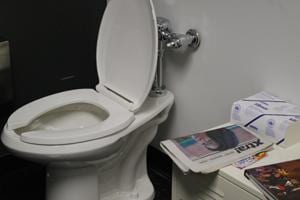Authorities at the University of Western Ontario may be clamping down on gay sex in so-called public spaces.
Last term a note appeared on gay cruising web site squirt.org – operated by Pink Triangle Press, the same company that publishes Xtra – that one of the two doors in a cruisey washroom on campus had been removed. The posting read that the washroom was no longer as private or safe for sexual encounters as it had been.
A few months later this reporter was approached by an acquaintance who works at the university. The man told me he was questioned by campus police as part of an investigation into gay sex in the men’s washrooms at the university. He suspects officers from the London Police Service noticed a high amount of interest on squirt.org by men looking for information on how to find sex at the university.
The man – who asked not be identified for fear of reprisal from his employer – said he told officers there was plenty of sex happening in public spaces among the heterosexual students as well. He said cleaning staff complained regularly about finding used condoms in the stairwells of the library where straight students meet. He said the police did not seem interested in this fact.
Within a week of that conversation, privacy barriers were installed between the urinals in the washroom at Thames Hall. These quaintly named “decency barriers” block men from being able to view or touch each other while using the urinals.
Within the last week, motion detectors were installed directly over the toilet stalls and above and behind the urinals in the same washroom. Green lights flash on the sensors when there is movement; red lights flash when there is not.
Brandon Watson, communications director for physical plant maintenance, told Xtra that physical plant electricians installed the sensors in the washroom, but that he didn’t know the reason for doing so or the sensors’ exact function. He did, however, say they were installed at the request of campus police.
“They must have decided there was some sort of issue in there and that’s how they wanted to solve the problem,” says Watson. “They must have decided that bathroom has some sort of issue where it needed to have some sort of sensored lighting,” he continued, but then added that he isn’t sure at all that was the purpose of the detectors.
“We did the work but we’re not too sure what the real reason was,” says Watson.
He says that is the only washroom in the building to have such sensors.
Campus police did not respond to either written or phone requests for an interview.
Paul Turner is a counter-surveillance expert who does private contract work for corporations and government agencies. He says the motion detectors may be there for three possible reasons: the sensors may be used to activate cameras placed in the washroom to record illegal activity; they may be used to alert security when someone is in the room; or they may simply be there to turn off the lights when the room is empty.
Turner says although it’s not unprecedented, he thinks it’s unlikely there are cameras inside the washroom.
“I know of one case where the police installed cameras in a public washroom as an investigative tool to gather evidence of criminal activity,” he says. That “criminal activity” was gay sex.
Nathalie Des Rosiers, general counsel for the Canadian Civil Liberties Association, says an investigation to determine the nature and function of the sensors would not be inappropriate. She says that if cameras were in use it would be severe breach of privacy to anyone using the washroom.
“There is an expectation of privacy, an enormous expectation of privacy when using such a facility,” she says.
Des Rosiers says an owner can always install cameras on private property such as the university, but they are required to disclose the surveillance to people entering the space. She says a warrant would likely be obtained from the courts to intercept communications and that she “can’t imagine it would not be done without the full knowledge and consent of the university.”
Gary Kinsman is a professor of sociology at Laurentian University in Sudbury and an expert on the history of policing gay sex in Canada.
”First of all, why is gay sex in the washrooms an issue worthy of police involvement?” he asks. “Secondly, it disturbs me that the police are using gay-cruising websites as a tool to investigate the gay community.”
In the past, police used undercover officers to make arrests and posted signs to scare people, say Kinsman, but the redesign of the physical layout of the washroom and the potential use of high-tech surveillance is both “new and alarming.”
Terry Guerriero is a gay lawyer in London, Ontario. He says he has not heard of arrests in washrooms or parks in London over the past few years. But, he says, “it’s London,” and it wouldn’t be the first time the community was targeted.

 Why you can trust Xtra
Why you can trust Xtra


